The Names You Need to Know: How Eight Democrats Ended 40 Days for a Maybe
Eight senators caved after 40 days for a vague ACA promise. 3.6 million Americans face doubled premiums. We do this again in eleven weeks.
📌 NOTE FOR NEW READERS:
The 50501 Movement organizes peaceful action across all 50 states to defend democracy. 80,000 subscribers strong and growing. If this resonates with you, hit subscribe and join the movement.
TL;DR: Last night, after 40 days of shutdown, eight Senate Democrats voted with Republicans to advance a deal to reopen government. They received a vague promise of a future vote on expiring ACA subsidies with no guarantee it will pass or even happen in the House. The government is only funded until January 30th, meaning we’re back here in eleven weeks. Healthcare premiums could spike for millions. Hundreds of thousands of federal workers missed paychecks over the 40-day shutdown for…this. Here are the eight names you need to know, what this means, and what we need to do next.
Shutdown Ends With a Shrug: Thanks for Your Sacrifice, Here’s a Maybe
It was Sunday night,
Senators had been scrambling all day. Behind closed doors, three former governors, Jeanne Shaheen, Angus King, and Maggie Hassan negotiated with Senate Majority Leader John Thune and the White House. By 8:30 PM, they emerged with a deal.
Eight Senate Democrats crossed over. They gave Republicans the votes needed to advance a funding bill that reopens government through January 30th. In exchange for 40 days of missed paychecks, shuttered parks, flight cancellations, and families at risk of losing SNAP benefits, Democrats secured… hope for a future vote. On ACA subsidies. Maybe.
There is no guarantee the subsidies get extended and no commitment from House Republicans to even hold the vote. Just a vague assurance that sometime in early December, the Senate might vote on whether to keep millions of Americans from seeing their healthcare premiums double.
That’s what this 40 day record breaking shutdown brought to us.
The Trade-Off That Wasn’t Worth It
Here’s what the eight Democrats who voted “yes” will tell you they secured:
1. A Vote on ACA Subsidies
Senate leadership “promises” a vote by mid-December on extending enhanced Affordable Care Act subsidies that expire at year’s end.
2. Federal Worker Protections
Reversal of Trump’s federal employee firings during the shutdown, plus provisions preventing future mass layoffs.
3. SNAP Funding
Food assistance funded through fiscal year 2026.
4. Backpay
Guaranteed pay for federal workers for time worked during shutdown.
Sounds reasonable, right? Except when you look closer.
The Receipts
On the ACA Vote:
There is no guarantee the subsidies will be extended. There is no commitment from House Speaker Mike Johnson to even hold a vote. Senate Majority Leader Thune floated this exact same offer weeks ago. Nothing changed except 40 more days of suffering.
On Federal Worker Protections:
These provisions only apply “through the duration of the stopgap”, meaning through January 30th. After that we will be right back here again.
On SNAP:
Yes, it’s funded through fiscal year 2026. But remember: just Saturday night, the USDA ordered states to reverse SNAP payments already issued. That uncertainty shows how fragile “guaranteed funding” really is when instability becomes the norm.
On Backpay:
Already required under a 2019 law. This wasn’t a concession. This was the legal minimum.
They really just got themselves a press release, a talking point, and a way to say they ended the shutdown without admitting they got nothing for it.
The Eight Who Voted Yes
You need to know their names. Because in eleven weeks, when we’re back at another shutdown deadline, these are the senators who will tell you to “trust the process” again.
The Eight Democrats (and one independent) Who Voted to End the Shutdown:
Catherine Cortez Masto (D-Nevada)
Dick Durbin (Democrat-Illinois)
John Fetterman (Democrat-Pennsylvania)
Maggie Hassan (Democrat-New Hampshire)
Tim Kaine (Democrat-Virginia)
Angus King (Independent-Maine)
Jackie Rosen (Democrat-Nevada)
Jeanne Shaheen (Democrat-New Hampshire)
These eight gave Republicans the 60 votes needed to break the filibuster and advance the bill.
Democrats Who Voted No:
Bernie Sanders (Independent-VT), Elissa Slotkin (Democrat-MI), Alex Padilla (Democrat-CA), Brian Schatz (Democrat-HI), and yes, Senate Minority Leader Chuck Schumer himself voted against his own caucus members deal.
And we have a kicker: Rand Paul (Republican-Kentucky) voted NO with the Democrats who opposed the deal.
When Rand Paul thinks your compromise went too far, maybe it’s time to reconsider.
No Guarantees, Just Higher Costs
For Healthcare
The enhanced ACA subsidies that help 3.6 million Americans afford healthcare expire at the end of this year. Without an extension, premiums will double for millions of people in January.
Democrats held out for 40 days demanding these subsidies be included in any deal. They settled for hope on a future vote with no guarantee of passage.
Millions of Americans are about to watch their healthcare costs skyrocket because eight senators decided a vague promise was good enough.
Senator Alex Padilla (Democrat-California), who voted NO on the deal, said it best: This bill does nothing “to stop premiums from doubling for millions of Americans.”
For Federal Workers
Hundreds of thousands of federal employees worked without paychecks for 40 days. TSA agents, park rangers, food safety inspectors, air traffic controllers all showing up, doing their jobs, with no idea when they’d be paid.
They’ll get backpay eventually. But “eventually” doesn’t cover rent when you’ve already missed over a month of pay, and could be right back in shutdown territory by February.
And the protections against future firings will expire January 30th when the stopgap runs out.
For Everyone Else
This deal funds the government only until January 30th.
Federal workers get less than three months of financial stability before they’re right back here again. Families on SNAP will get eleven weeks of certainty. Air travelers get a brief respite before flight cancellations resume.
Is this not crisis management on an 11-week loop?!
Do any of these eight senators represent your state? Have you called them? Drop your state below and your plan to hold them accountable. Share your script or what you said to your senators to help inspire others.
The Voices That Mattered And Didn’t
Some Democrats saw this coming and tried to stop it.
Bernie Sanders warned Sunday that caving now “would be a policy and political disaster.” He called it “a horrific mistake to cave in to Trump right now.”
Senator Elissa Slotkin, who wasn’t included in final negotiations, said she “always said it’s got to do something concrete on health care, and it’s hard to see how that happened.”
A Democratic senator, said they were “unwilling to accept a vague promise of a vote, at some indeterminate point in the future, on an undefined bill extending the subsidies.”
Meanwhile, John Fetterman, one of the eight who voted yes, told his colleagues to “stop overplaying” their hand and accused Democrats of “overplaying” the healthcare issue. He called the shutdown a “disgrace” and “embarrassment” and said Democrats accomplished nothing in 40 days “except a lot of chaos and a lot of upheaval.”
So which version of the Democratic Party do you want? The one that holds the line on healthcare for millions? Or the one that folds after 40 days because the other side made them uncomfortable?
Fold Once, Pay Twice
This isn’t the first time Democrats have made this mistake.
In 2011, Democrats agreed to spending cuts in exchange for raising the debt ceiling. Republicans learned they could extract concessions through brinksmanship. Shutdowns became a regular tool.
In 2013, Republicans shut down government for 16 days to defund Obamacare. Democrats held firm that time and won. The government reopened with no concessions to the defund effort.
By accepting this deal after 40 days, these eight Democrats just taught Republicans that if they hold out long enough, Democrats will fold. And they’ll do it for nothing more than a vague promise with no teeth.
Will Democrats stand firm on January 30th? Or will they remember that last time, they held out 40 days and got nothing so why bother trying?
This deal taught us that resistance is futile and that holding out only prolongs pain without changing outcomes. It’s the opposite of what this moment needed.
We’ve Got Eleven Weeks. Start Here.
We have eleven weeks before this happens again.
1. Call the Eight Especially If They Represent You
If you live in Nevada, Illinois, Pennsylvania, New Hampshire, Virginia, or Maine, one of these eight senators works for you. Please, call them.
U.S. Capitol Switchboard: (202) 224-3121
What to say:
“Hi, my name is _______, I’m a constituent from *city*. I’m calling about Senator *Name*’s vote Sunday night to end the shutdown. I want to know what guarantee do we have that ACA subsidies will be extended? What happens when premiums double for 3.6 million Americans in January? And why should I believe this won’t happen again in eleven weeks when government funding runs out? I’m watching, I’m disappointed, and I will remember this.”
Congressional offices track constituent sentiment religiously.
If these eight senators get flooded with calls expressing disappointment, it changes the calculation for January 30th.
2. Prepare for January 30
Mark your calendar.
January 30, 2026.
That’s when government funding runs out again.
Join or follow organizations tracking shutdown negotiations: 50501 groups, Indivisible, MoveOn, other state Resistance groups
Set a Google Alert for “government funding January 2026”
Screenshot this post as a reminder of what happened last time
They expect us to forget. We won’t.
3. Support Groups Fighting for ACA Subsidies
While the Senate plays games, organizations are doing important work to protect healthcare access.
Where to focus:
Protect Our Care (protectourcare.org) A National coalition defending ACA
Families USA (familiesusa.org) A Consumer health advocacy
Your state’s health insurance marketplace assistance programs
What you can do:
Donate if you can afford it
Share their resources about the subsidy cliff
Attend virtual advocacy days
Tell your story if you rely on subsidies
These groups have the infrastructure and expertise to fight the subsidy battle in December. They need support, visibility, and voices.
4. Talk to Three People Who Don’t Follow Politics Closely
Most Americans have no idea what just happened or what’s coming for their healthcare costs.
Here is an example of what you could say:
“Hey, just a heads up, if you get health insurance through the marketplace, your premiums might double in January. The subsidies that keep costs down are expiring, and Congress just kicked the can down the road instead of fixing it. You might want to check your plan and budget for higher costs, just in case.”
When millions of people suddenly see doubled premiums in January, there will be outrage. The earlier people know this is coming, the more time they have to prepare and to make their voices heard before it happens instead of after.
5. Document Everything
Screenshot this post. Save the names of the eight senators. Bookmark coverage from credible sources. Keep receipts.
Why? Because when premiums double in January, you’ll hear: “Nobody could have seen this coming.” “It’s complicated.” “Both sides share blame.”
And you’ll be able to say: Actually, we knew exactly what would happen. Eight senators chose a vague promise over guaranteed protection. Here are their names, here’s what they said and here’s what we said would happen.
History is written by whoever has the best documentation.
The Deal Is Done. The Damage Is Ongoing.
The eight senators who voted yes will tell you they ended a crisis. They’ll point to federal workers getting backpay, to SNAP being funded, and to the government reopening.
What they won’t tell you is that they just taught Republicans that Democrats can be outlasted and they won’t mention that 3.6 million Americans are about to see healthcare costs skyrocket. They also won’t talk about how we’re doing this exact same thing in eleven weeks.
This was capitulation dressed up in press-release language.
Not One More Shutdown Without a Fight
We have eleven weeks to build the pressure, to mobilize the voices, to make it impossible for anyone in Washington to ignore what’s about to happen to our healthcare costs.
You don’t have to be a political expert or have insider connections or lobbying experience to participate.
You just need to be someone who believes that 40 days of a shutdown should have bought more than a press release.
Healthcare shouldn’t be a bargaining chip.
Call tomorrow, support organizing groups, and talk to your neighbors.
Document everything.
Eleven weeks is more than enough time to turn disappointment into determination.
We’re 80,000 readers strong. If every one of us calls one senator, talks to three people, and donates $10 to an ACA advocacy group, that’s:
80,000 constituent calls logged
240,000 conversations about healthcare costs
$800,000 in resources for advocacy organizations
To Our 80,000+ Accountability Partners
You’re here because you believe in receipts.
You save the names and are marking deadlines on your calendar.
When they say “nobody could have predicted this,” you pull up the articles from eleven weeks ago that predicted exactly this.
That’s accountability.
And that’s part of why this community exists.
Before you close this tab: Subscribe to track what happens between now and January 30th, or forward this to someone who needs to know the eight names. Accountability works when we hold it together.
Blue | The 50501 Movement | 80,000+ Reader Activists Strong | fiftyfifty.one
Resources & Sources
Call Your Senators
Capitol Switchboard: (202) 224-3121
Find local mutual aid: MutualAidHub.org
ACA Advocacy Groups
Key Sources for This Analysis
Mark Your Calendar
January 30, 2026 is the Next shutdown deadline



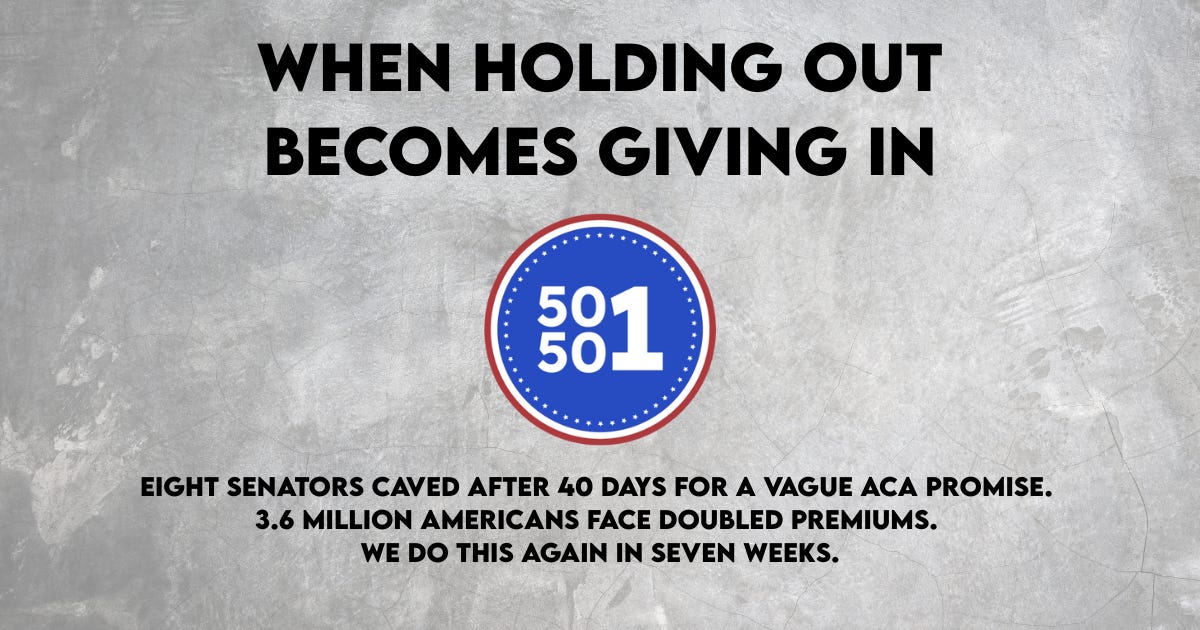
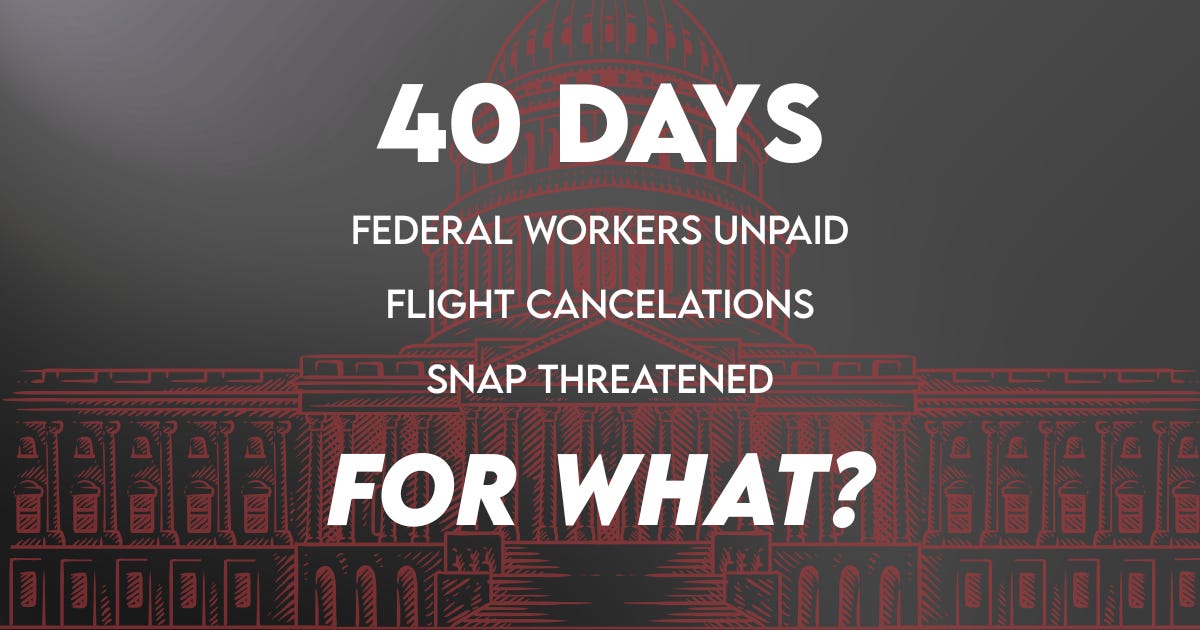
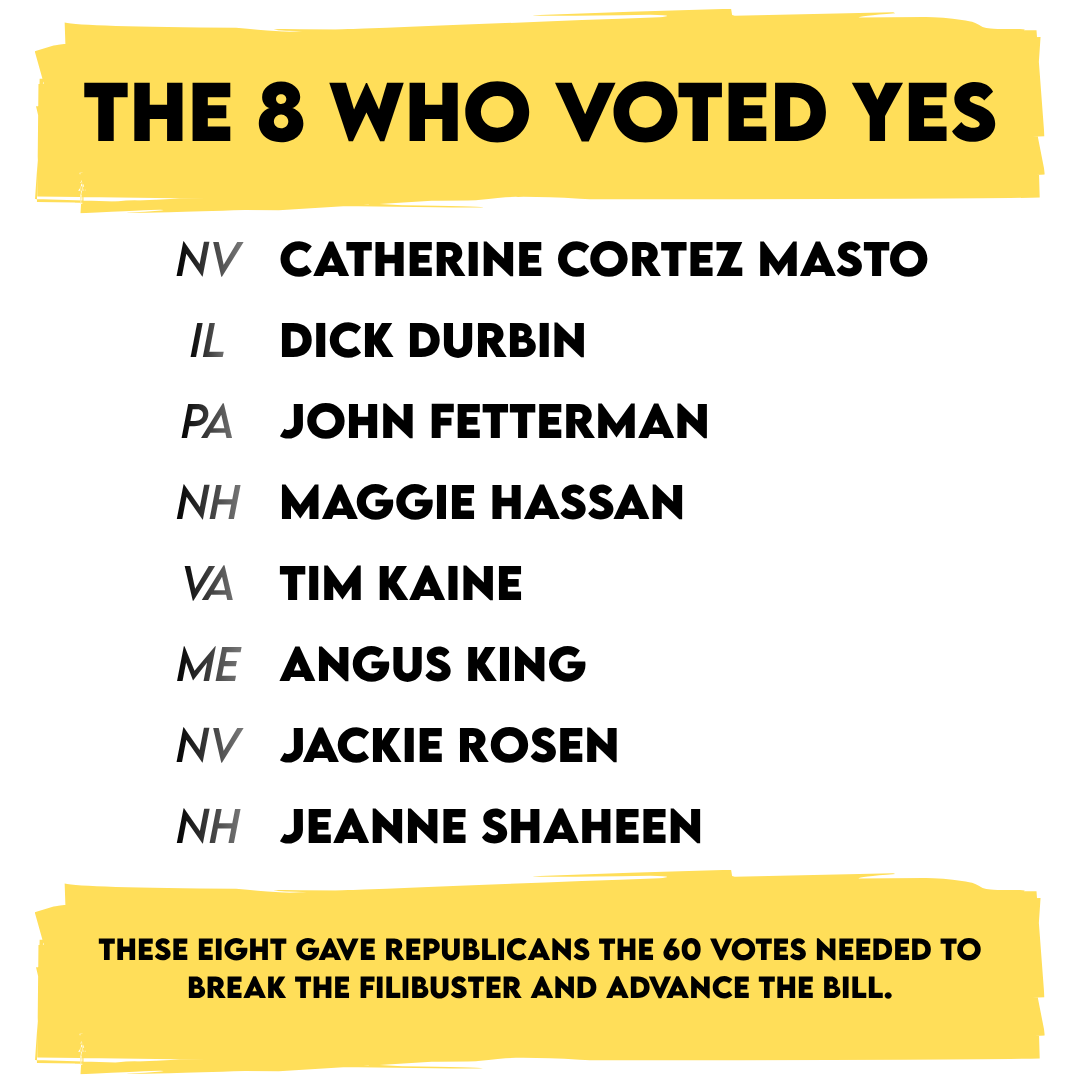
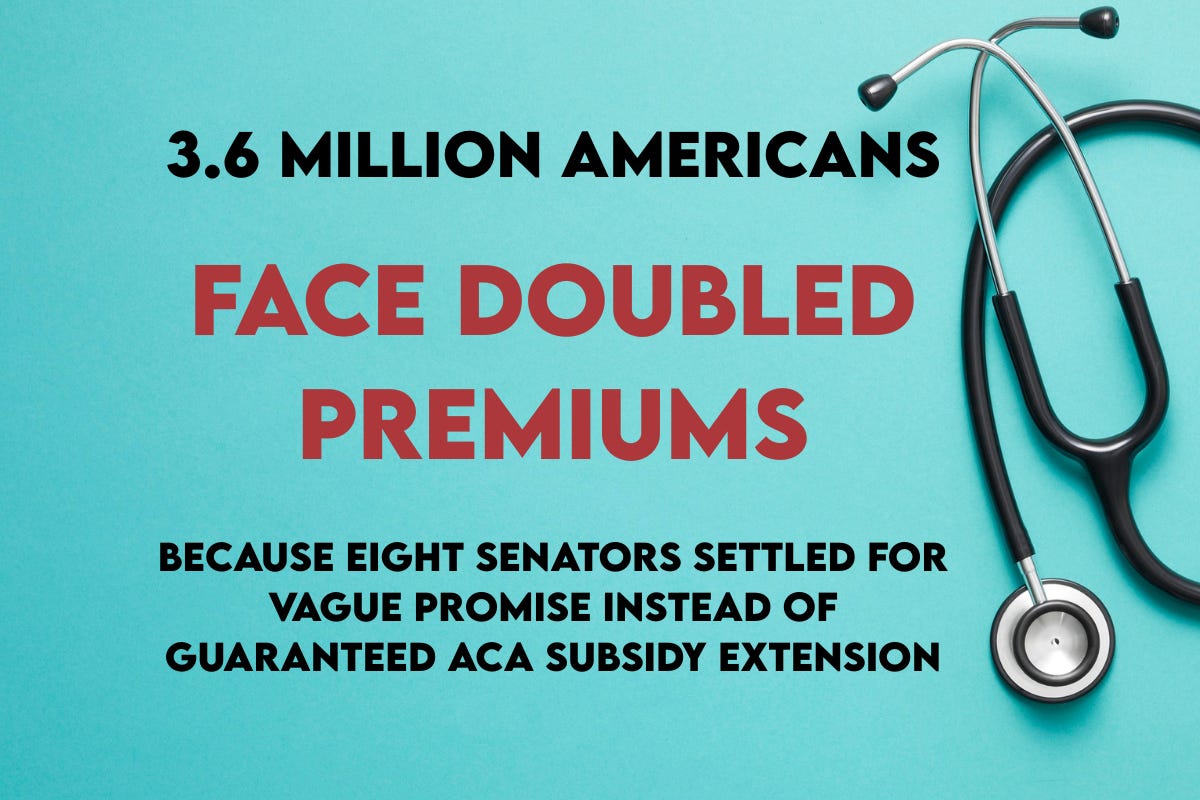
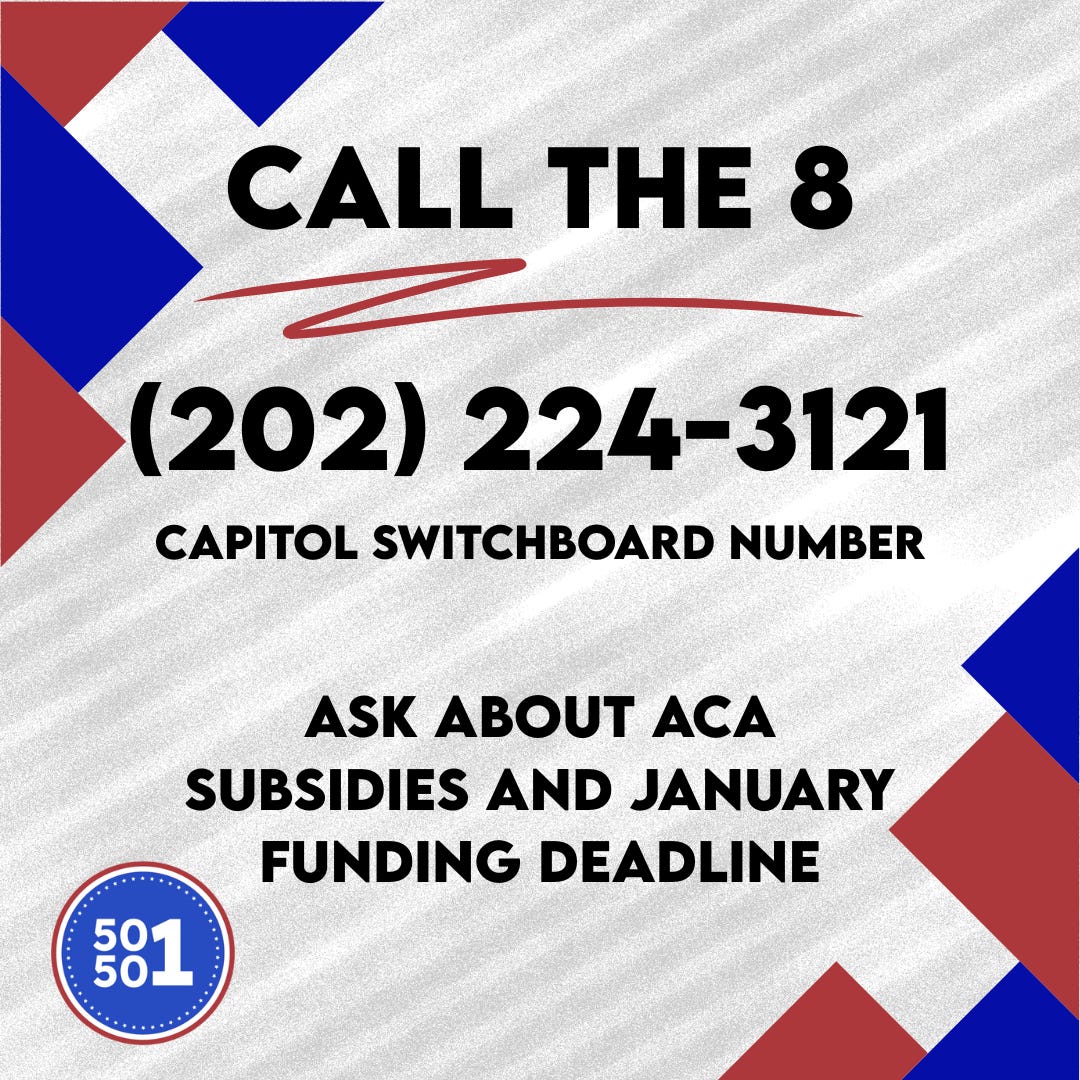
I'm angry and bitterly disappointed. We worked hard. We were winning. Our own side stabbed us in the back.
Can’t trust anything Republicans say they will do.